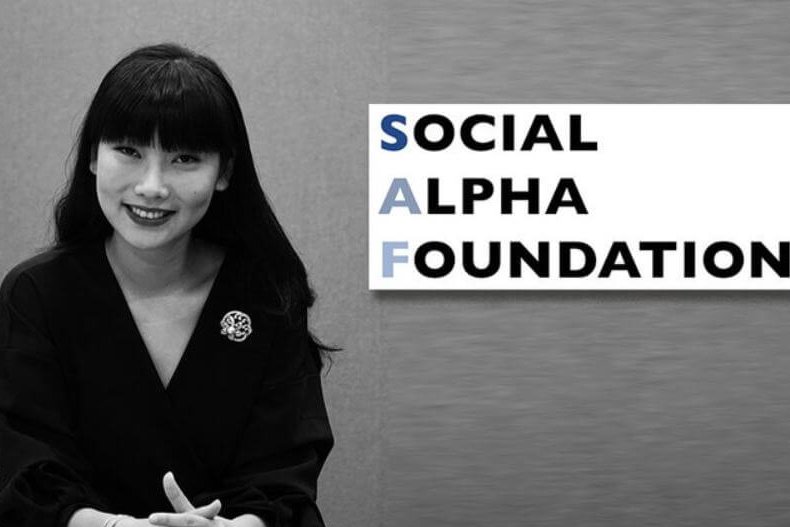

Nydia Zhang
Nydia Zhang has embraced blockchain technology with the aim of encouraging philanthropy. She and her husband are the co-founders of Social Alpha Foundation.
The Hong Kong-based foundation was established two years ago, in 2017, and she is now chairman.
She is a Washington graduate who used to work in the art world.
“My story started in 2015 and the first time I heard about it was through my husband. I bought my Bitcoin and Ether in 2016 and I saw how this brand-new industry had grown and developed,” she says.
SAF is a funding platform that offers grants to those involved in projects using blockchain for the greater good.
So far, they’ve made a number of grants ranging in value focusing on public health, the environment and education.
Among the recipients are Amply – a not-for-profit project in South Africa building a digital identity and subsidy management system on the Ethereum blockchain for preschools.
Children can gain access to quality education and financial support using Amply.
SAF also supported Blockchain Symposium – a seminar organised by the Consulate-General of the Netherlands and the United Nations Office for Project Services last September.
The Blockchain Trust Accelerator received a six-figure grant from SAF to build The Impact Ledger – a definitive registry of social impact blockchain projects spanning non-profit, public and for-profit sectors. It will promote understanding and resources to blockchain for social impact projects.
Earlier this week, the Yale openlab received a six-figure anchor grant from SAF to tackle climate change.
The grant will consolidate its skill-based blockchain education ecosystem, featuring blockchain boot camps.
It will also launch the Open Earth Challenge, an open source blockchain-enabled framework to achieve consensus on the earth’s carbon budget.
The organisation has rigorous criteria – the grantee must me non-commercial to guarantee selection not “because they are against commercial companies”, but merely they wanted to provide more resources to do good with blockchain.
She says when they were first established it was “exciting yet worrying” as a lot of people were “rushing in” to the cryptocurrency and blockchain space as a result of the price rise in crypto.
The “financial impact of the cryptocurrency hype” was a bit of a concern initially. However, this has gone away as the price has plummeted throughout 2018 and is now moving generally sideways.
She says it’s “really important” for mass adoption that members of the public can see the “potential offered by the blockchain and the real-life world impact.”
This year they are focusing their activities on the environment as the planet is in dire need of help and is facing a global catastrophe environmentally. “There is no better time for the environment,” she says. “Environment issues are in crisis in the entire world and I hope the blockchain can offer some of the solutions to different countries.”
“I can hope it will alleviate some of the environmental problems in different jurisdictions.”
She also chairs the Financial Inclusion Committee, as part of the FinTech Association of Hong Kong. It examines new ways of utilising blockchain to reach sustainable development goals such as lowering poverty, correcting equality and environment problems.
Gender imbalance is an ongoing issue for the space, but it’s heartening to see a high proportion of women working for SAF. “I believe strong demand for great talent has attracted more women to the space,” she says. “Diversifying and making it more gender neutral could positively impact the space as more businesses move towards incorporating the technology.”
She says fin tech is “definitely a male-dominated industry.” But we are starting to see “outstanding female leaders in the space coming in and getting involved in blockchain.” Women need to understand and evaluate their strengths she says rather than worrying what they can’t do.
Zhang says that if the blockchain industry is to achieve mainstream status, it has no choice but to submit to regulation.
There’s still a “lack of information” about blockchain technology and lack of “public understanding” which can hinder mass adoption of the tech.
In the long run, Zhang is confident the blockchain will one day be widely adopted by governments, businesses and other ventures everywhere, and that its technology will be as common as the internet.
Mass adoption could come in the next few years, she believes. “It could be quite soon in the next two or three years,” she adds. “With blockchain, the entire cryptocurrency market has had a tremendous downturn and this is a crucial moment for us to drive blockchain adoption.”
“This is blockchain that can have a real social impact. I want to see more blockchain environmental resources as planet earth is really facing a crisis. I hope technology can be one more solution.”
Denver, Colorado, 24th February 2025, Chainwire
Denver, Colorado, 20th February 2025, Chainwire
Washington, D.C., 18th February 2025, Chainwire
Dubai, UAE, 27th January 2025, Chainwire
Those who enter the market at this time may be surprised to hear that Bitcoin…
George Town, Grand Cayman, 22nd November 2024, Chainwire